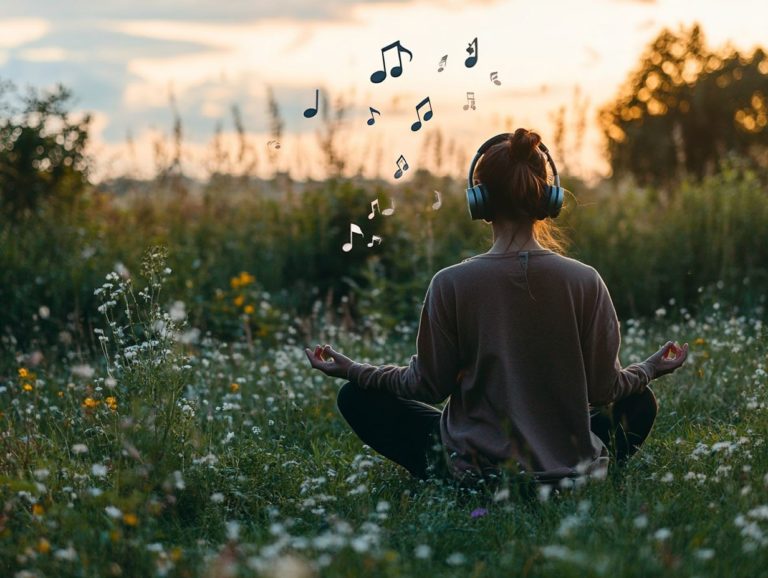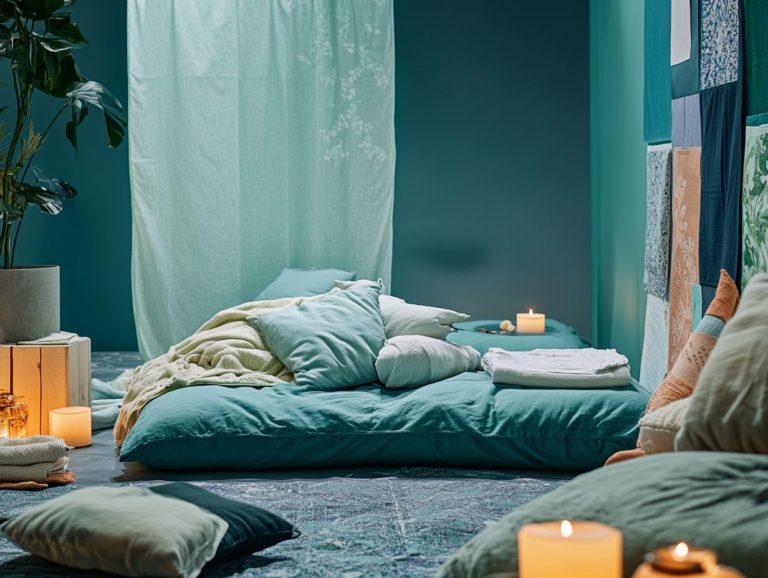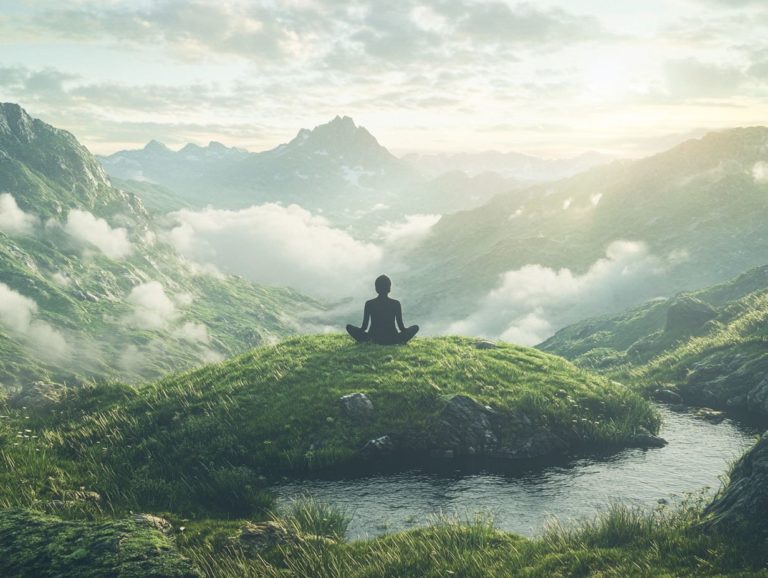How to Build a Relaxation Routine
In today s fast-paced world, finding time for relaxation is crucial for both your mental and physical well-being. This article delves into the significance of relaxation and provides you with a roadmap to develop a personalized routine that aligns with your unique needs and aspirations.
You ll discover a variety of techniques to seamlessly integrate into your daily life, along with practical tips to maintain consistency. The benefits of regular relaxation are profound, enhancing your overall quality of life.
By the end, you ll be well-equipped to embrace a calmer, more balanced lifestyle.
Contents
Key Takeaways:
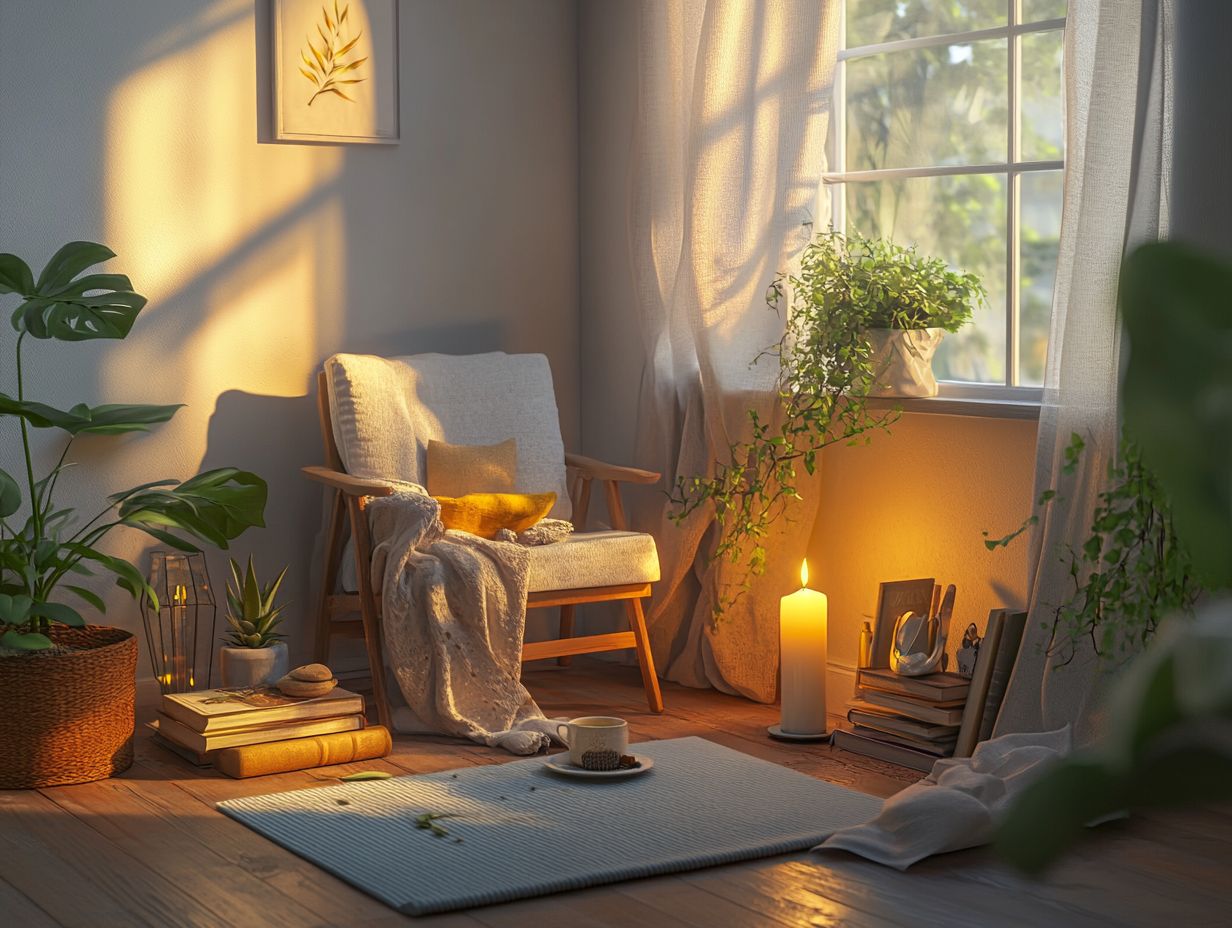
- Making time for relaxation in your daily routine is essential for mental and physical health.
- Identify your personal needs and goals, and choose relaxation techniques that suit you best.
- A regular relaxation routine can lead to improved stress management and better sleep, enhancing overall well-being.
Understanding Relaxation
Understanding relaxation means acknowledging its important role in both mental and physical health, especially in today s fast-paced world filled with stressors like work pressures, relationship dynamics, and the lingering impacts of events such as COVID-19.
Techniques like mindfulness meditation, deep breathing exercises, and progressive muscle relaxation can help you cope better, ease anxiety, and foster emotional well-being.
By exploring various relaxation methods, you can effectively manage muscle tension, refine your relaxation response, and cultivate a more balanced life free from overwhelming stress.
The Importance of Relaxation for Mental and Physical Health
The significance of relaxation for your mental and physical health cannot be overstated; it plays a pivotal role in managing stress and enhancing emotional well-being. When you weave relaxation techniques into your daily routine, you may notice remarkable improvements in your overall wellness.
Try out fun methods like guided imagery, which allows you to visualize serene environments, creating a sense of peace and tranquility. Breathing exercises can help ground your thoughts and foster calmness, effectively reducing anxiety levels.
These practices do more than just alleviate stress; they also boost cognitive function, leading to sharper decision-making and a brighter mood. Relaxation also benefits your physical health by lowering blood pressure and improving sleep quality both essential for maintaining optimal bodily functions.
Creating a Relaxation Routine
Establishing a relaxation routine is vital for seamlessly integrating effective stress-relief techniques into your daily life. This thoughtful practice not only cultivates enhanced emotional well-being but also supports your physical health, paving the way for a more balanced and fulfilling existence.
Identifying Your Needs and Goals
Identifying your needs and goals is the crucial first step in crafting an effective relaxation routine that caters specifically to your unique stress management requirements.
Engaging in self-assessment allows you to gain a clearer perspective on your personal triggers and stressors, guiding you toward the most suitable techniques for your relaxation journey. Consider using tools like journals, mindfulness exercises, or guided questionnaires to explore your emotional landscape more deeply.
Once you’ve gathered these insights, they can illuminate the path toward tailored approaches such as deep breathing, yoga, or progressive muscle relaxation. This ensures that the methods you choose align with your specific preferences and desired outcomes. Such personalized understanding greatly enhances the effectiveness of your relaxation practice, making it a rewarding experience.
Start your journey to relaxation today! Choose one method and practice it daily.
Choosing Relaxation Techniques
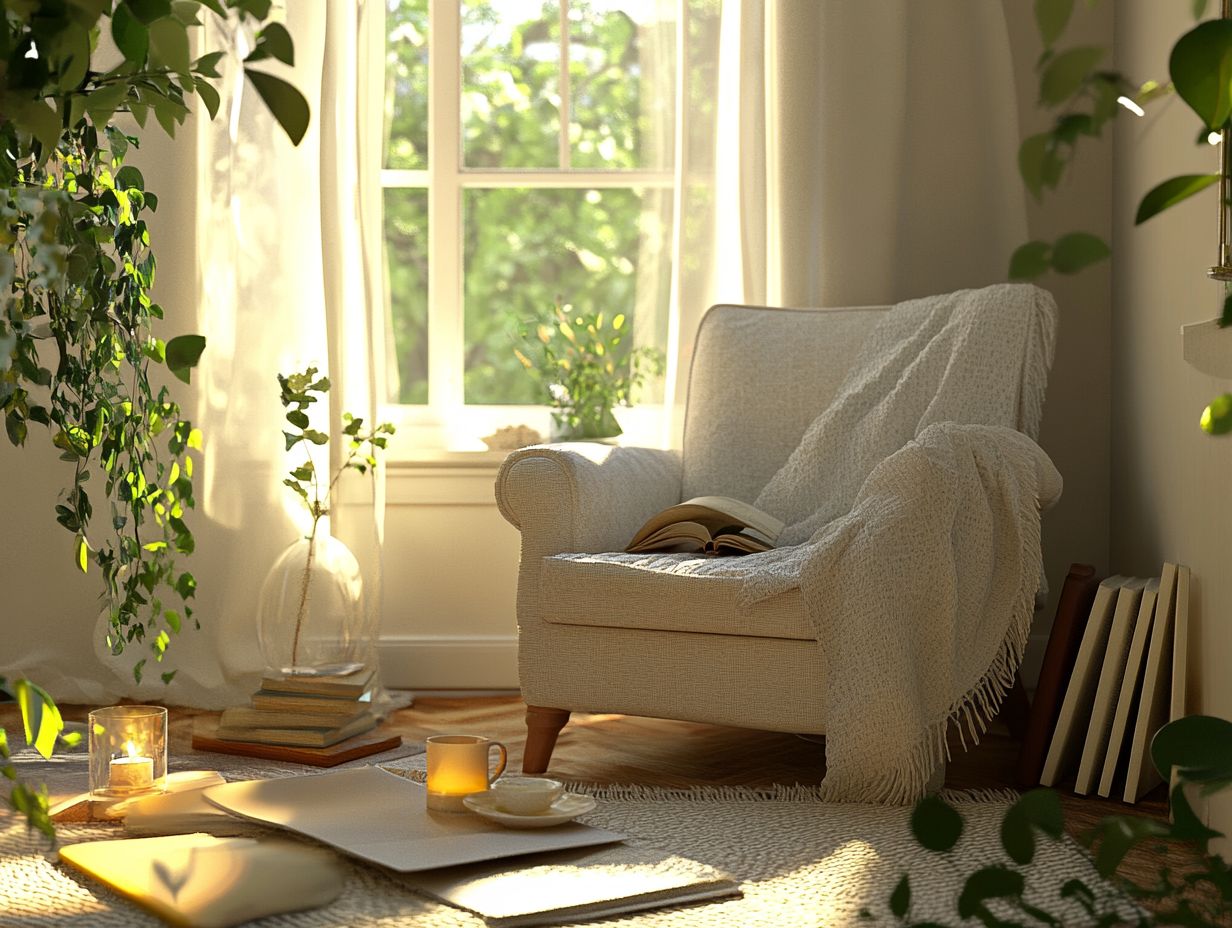
Choosing the right relaxation techniques is essential for managing stress effectively and enhancing your emotional well-being. Not every method will resonate with you.
Understand your unique preferences and needs to discover effective ways to relieve stress. For example, mindfulness meditation invites you to embrace present-moment awareness, allowing you to observe your thoughts without judgment. This practice can significantly reduce anxiety.
Progressive muscle relaxation guides you through tensing and relaxing different muscle groups, promoting both physical ease and mental clarity. If you re looking for something more dynamic, yoga merges physical poses with breath control and mindfulness, offering mental and physical benefits suitable for various fitness levels.
Similarly, tai chi offers gentle movements that foster balance and relaxation, ideal for those seeking low-impact exercise. Explore these techniques to find the best way for you to relax.
Incorporating Relaxation into Your Daily Life
Incorporating relaxation into your daily life demands a commitment and an awareness of how different techniques can seamlessly blend into your routine. This can elevate your emotional well-being.
Finding Time and Space for Relaxation
Finding the right time and space for relaxation can transform your practice! Establishing a tranquil environment significantly enhances your experiences with activities like meditation and yoga.
The early morning or late evening often emerges as the perfect opportunity to unwind, as these moments are typically quieter and conducive to self-reflection.
Creating a dedicated space free from distractions cultivates peace and signals your mind that it s time for restorative practices. Now is the perfect time to integrate elements like soft lighting, soothing aromas, and calming music to enhance the ambiance.
Thoughtfully selecting both the time and space nurtures a routine that supports your relaxation journey.
Tips for Sticking to Your Routine
Are you struggling to stick to your relaxation routine? With a few simple strategies, you can enhance your commitment to emotional well-being and effective stress management.
One powerful approach is to find an accountability partner who shares your goals. Having someone by your side can significantly boost your motivation.
Set reminders on your phone or use a planner to make techniques like mindfulness exercises or deep breathing an integral part of your day. Periodically assess which methods resonate with you, whether it s yoga, meditation, or a leisurely stroll in nature.
Adjusting your routine based on what feels right keeps the practice fresh and enjoyable, leading to a healthier, more balanced life.
Benefits of a Regular Relaxation Routine
Establishing a regular relaxation routine presents many benefits, including better stress management, enhanced emotional well-being, and an overall improvement in your health. Embracing this practice can transform your daily life, allowing you to navigate challenges with greater ease and cultivate a sense of balance and tranquility.
Improved Stress Management
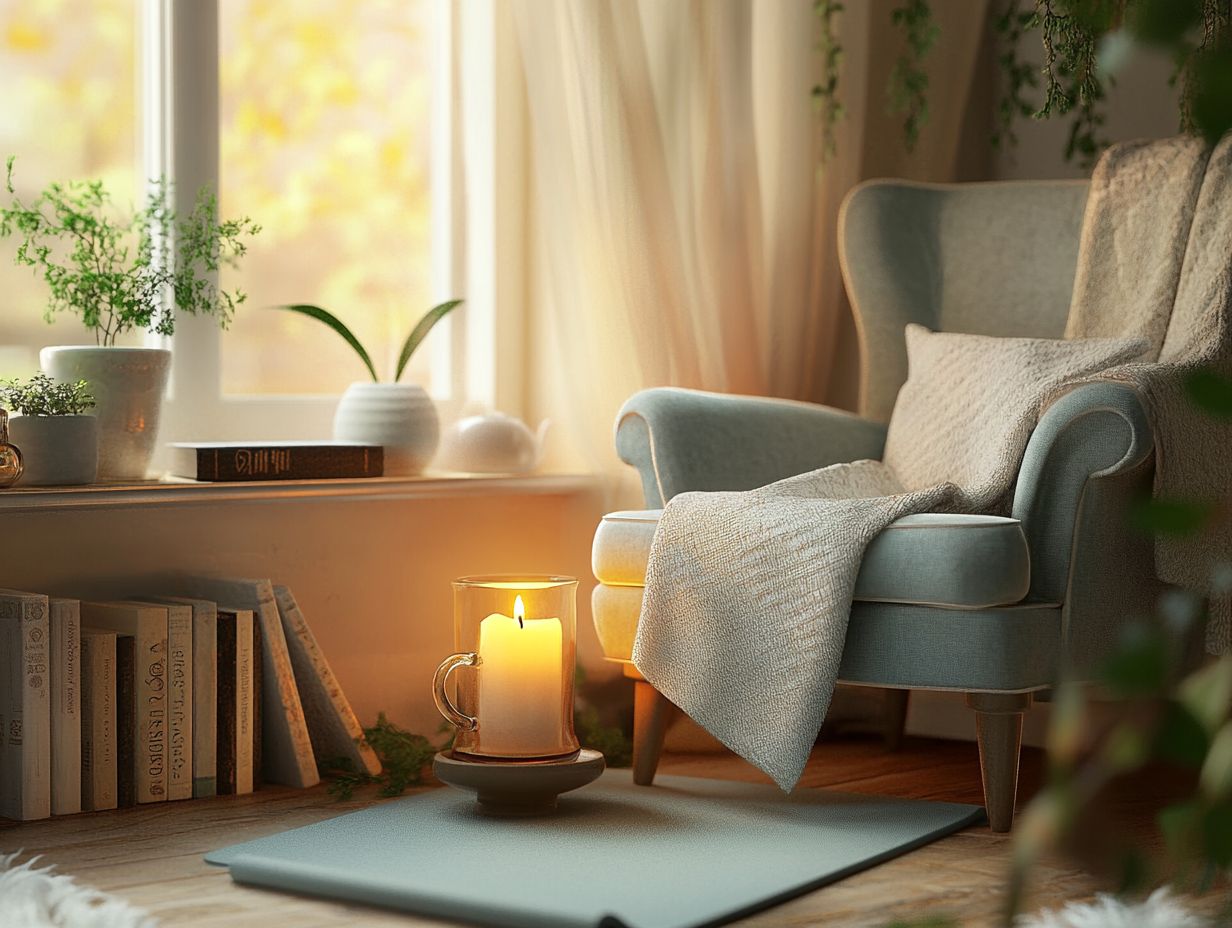
Improved stress management stands out as one of the primary benefits of establishing a regular relaxation routine, allowing you to deal with emotional stress easily.
By seamlessly integrating various relaxation techniques into your daily life, you will help lower your heart rate, which in turn alleviates feelings of anxiety and tension. Practices such as deep breathing, meditation, and progressive muscle relaxation a technique where you tense and relax muscle groups to reduce tension cultivate a soothing sense of calm and enhance your overall coping skills.
These techniques give you the power to tackle stressful situations with a clearer mind, ultimately fostering healthier emotional responses.
Embracing these methods leads to improved mental clarity and resilience, both of which are essential for effectively managing life s challenges.
Better Sleep and Overall Well-being
Implementing a regular relaxation routine can transform your sleep quality and overall well-being, positively impacting both your mental and physical health.
Incorporating techniques like deep breathing, meditation, and progressive muscle relaxation creates a calming environment. This not only helps you unwind but also prepares your body for restorative sleep.
By alleviating stress and anxiety, these practices pave the way for a more tranquil mind essential for achieving deeper sleep cycles.
As you prioritize relaxation, you will notice your mood improving and your energy levels soaring throughout the day, reflecting a significant boost in your overall health.
Ultimately, fostering a consistent relaxation practice can serve as a powerful strategy to enhance your sleep quality and support your holistic wellness.
Additional Tips for Relaxation
Beyond establishing a routine, explore various strategies to elevate your relaxation practices and refine your coping skills, ultimately leading to improved emotional well-being.
Combining Relaxation Techniques
Combining relaxation techniques, such as mindfulness meditation and yoga, can significantly elevate your overall practice and amplify the benefits for both your mental and physical health.
By integrating mindfulness meditation, yoga, and deep breathing exercises, you can craft a holistic approach to wellness that effectively targets stress reduction and emotional balance, helping you cope with daily challenges.
For instance, mindfulness meditation fosters a heightened awareness of the present moment, which can help ease anxiety and promote positive self-talk. Meanwhile, yoga enhances flexibility and strength, nurturing both a tranquil mind and a revitalized body.
Deep breathing exercises are essential for activating your body s relaxation response, making it easier to tackle everyday challenges. Together, these techniques form a comprehensive toolkit that gives you the power to cultivate a more resilient and peaceful state of mind.
Seeking Professional Help if Needed
If relaxation feels out of reach, don’t hesitate to seek help from resources like BetterHelp, which can offer you invaluable guidance and support.
Understanding the root causes of your stress and emotional turmoil often requires expert insight. Engaging in therapy creates a safe space where you can explore your feelings, gain deeper insights, and develop effective coping strategies.
Incorporating practices like massage therapy can significantly enhance your journey toward relaxation, easing tension in both your mind and body. Professionals in these fields can tailor techniques specifically for your needs, helping you cultivate a sense of inner peace.
Remember, nurturing your mental health is just as essential as maintaining your physical well-being, and seeking help is a proactive step toward achieving a more balanced and fulfilling life, especially during stressful times like the COVID-19 pandemic.
Frequently Asked Questions
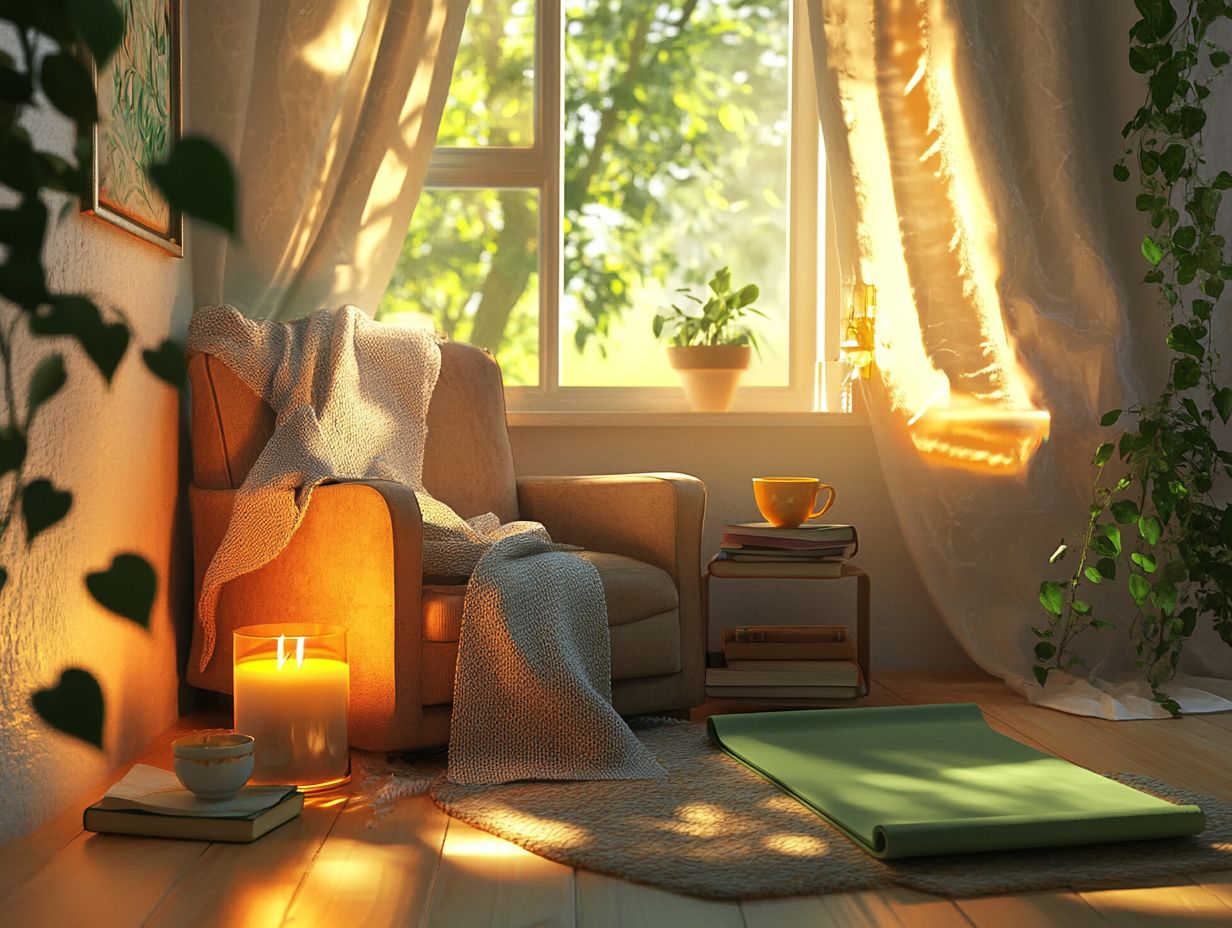
What is a relaxation routine?
A relaxation routine is a set of activities designed to promote relaxation and reduce stress. These self-care practices help individuals manage their mental and emotional well-being.
Why is it important to have a relaxation routine?
Having a relaxation routine allows you to take breaks from daily stresses. It improves mental health, reduces anxiety, and promotes better sleep.
How do I start building a relaxation routine?
Start by identifying calming activities that you enjoy. This could include meditation, yoga, listening to music, taking a bath, or going for a walk.
Set aside specific times each week for these activities.
What are some benefits of a relaxation routine?
A relaxation routine offers many benefits. It reduces stress and anxiety, improves mood, enhances sleep quality, and boosts self-awareness.
How often should I practice my relaxation routine?
Your routine’s frequency depends on personal needs and schedule. Some may benefit from daily practice, while others might prefer a few times a week.
Consistency is key.
How can I make my relaxation routine more effective?
To enhance your routine, try different activities. This prevents boredom and helps you discover what works best.
Creating a specific space for your routine and eliminating distractions can also help.
Start building your relaxation routine today! Discover what activities resonate with you and transform your mental well-being.


